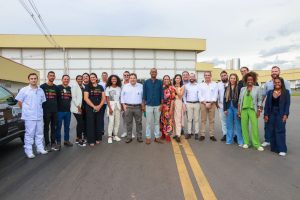The second agricultural mill, promoted by Adial, will bring together opinion leaders in Goiás to discuss topics such as environmental, social and governance practices, biofuels and innovation in the agricultural industry, promoting the country as a reference in national agribusiness.
Agribusiness plays a central role in Goiás’ economy, accounting for 60% of the state’s GDP. In 2023, the sector reached its highest employment level in the last 11 years, with more than one million workers, equivalent to 26.6% of the state’s workforce. Between 2012 and 2023, agribusiness added 95,446 new employees, according to data from the Brazilian Institute of Geography and Statistics (IBGE).

In 2022, Goiás was responsible for 9.3% of the national agricultural production value, fueling the significant growth in recent decades. This progress is due to the modernization of the sector, the use of advanced technologies and increased productivity. To highlight the importance of agribusiness in Goiás, both at the state level and on the national stage, the Industrial Development Association of the State of Goiás (ADEAL) will hold the second Agri-Mill from October 15 to 19. The event will bring together 15 opinion leaders who will visit agribusiness in Goiás and discuss topics such as environmental, social and governance practices, biofuels, sugar production, animal protein and cereals, genetic improvement and regenerative agriculture.
According to Adial’s Chairman of the Board, Ze Garrot, “Agribusiness and agro-industries are fundamental to the economic development of Goiás and Brazil. These sectors are the engines that drive the economy and strengthen Brazil’s role as a global leader in food production.
He highlights that “Goiás has a tremendous wealth of natural resources. We have fertile soil, abundant water and a hard-working and qualified people. The state’s strategic location, in the heart of Brazil, provides important competitive advantages.
“Water is an indispensable resource for development,” Garut also emphasizes. “Everything around us – from the clothes we wear to the food we consume – comes from soil and agriculture. Agribusiness itself already plays an important role, but when we add value to products through agribusiness, the results are even better. Processing agricultural products boosts the economy, creates jobs and promotes sustainable development.”
The market

Agribusiness in Goiás is responsible for about 60% of the state’s GDP, and its exports correspond to 96.7% of the state’s total exports. Goiás is strengthening itself as an important exporter in the international market, with an emphasis on trade relations with China, the United States and the European Union. The sector is divided into three levels: primary (rural producers), secondary (agro-industries and inputs), and tertiary (distribution, trade and services), with the tertiary sector accounting for 38.4% of jobs.
Participation in the national arena
Goiás’ share in the value of national agricultural production jumped from 3.6% in 1974 to 9.3% in 2022, according to IBGE. The state stands out in the production of soybeans, corn and sugarcane. Soybeans occupy 53.7% of the cultivated areas, followed by corn (25.3%) and sugarcane (12.2%). Municipalities such as Rio Verde and Jataí are national leaders in soybean production.
exhaustion
Women’s participation in agribusiness in Goiás has also increased. Since 2012, the number of women in the sector has increased by 56,284. In 2023, men will occupy 66.2% of vacancies, with a total of 679,188 workers, while women will represent about a third of the jobs, with 326,013 vacancies.
Innovation and Sustainability
Agribusiness in Goiás is increasingly linked to innovation and sustainability. Practices such as the integration of crops, livestock and forests (ILPF) and the use of advanced technologies are increasing productivity and reducing environmental impact. The expansion of second-generation ethanol production and the adoption of more efficient agricultural techniques are examples of how the country is seeking to align production with environmental conservation.
The sugar and energy sector, which is particularly important in this context, contributes to the clean energy matrix of Goiás and Brazil. “Agribusiness in Goiás goes beyond food production, integrating innovation, sustainability and socio-economic development, strengthening its relevance on the national and international stage,” concludes Adial CEO, Edual Portilho, known as Tchequinho. (Consultant)


